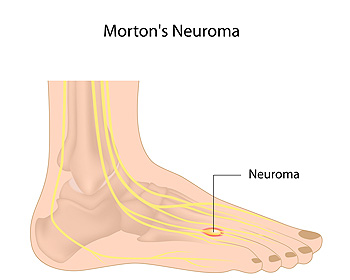Connect With Us
Blog
Items filtered by date: October 2022
Can Arthritis Cause Ankle Pain?

There are several reasons why people have ankle pain, and one of them may be arthritis. Arthritis can be a debilitating condition that can cause severe ankle pain and discomfort, and it may be difficult to move the foot. The ankles may become swollen and stiff, and wearing shoes could become challenging. The most common form of arthritis is osteoarthritis, and this may cause wear and tear on the ankle joints. The condition known as lupus can cause a considerable amount of swelling in the ankles and may even turn them blue from becoming cold. One of the first things that is noticeable with reactive arthritis can be an inflamed Achilles tendon, which is in the back of the lower leg. If you have ankle pain for any reason, it is strongly suggested that you seek the counsel of a podiatrist who can determine what the cause is as well as offer you the correct treatment options.
Ankle pain can be caused by a number of problems and may be potentially serious. If you have ankle pain, consult with Michael Tomey, DPM from Cary Foot & Ankle Specialists. Our doctor will assess your condition and provide you with quality foot and ankle treatment.
Ankle pain is any condition that causes pain in the ankle. Due to the fact that the ankle consists of tendons, muscles, bones, and ligaments, ankle pain can come from a number of different conditions.
Causes
The most common causes of ankle pain include:
- Types of arthritis (rheumatoid, osteoarthritis, and gout)
- Ankle sprains
- Broken ankles
- Achilles tendinitis
- Achilles tendon rupture
- Stress fractures
- Bursitis
- Tarsal tunnel syndrome
- Plantar fasciitis
Symptoms
Symptoms of ankle injury vary based upon the condition. Pain may include general pain and discomfort, swelling, aching, redness, bruising, burning or stabbing sensations, and/or loss of sensation.
Diagnosis
Due to the wide variety of potential causes of ankle pain, podiatrists will utilize a number of different methods to properly diagnose ankle pain. This can include asking for personal and family medical histories and of any recent injuries. Further diagnosis may include sensation tests, a physical examination, and potentially x-rays or other imaging tests.
Treatment
Just as the range of causes varies widely, so do treatments. Some more common treatments are rest, ice packs, keeping pressure off the foot, orthotics and braces, medication for inflammation and pain, and surgery.
If you have any questions, please feel free to contact our office located in Cary, NC . We offer the newest diagnostic and treatment technologies for all your foot care needs.
Wounds That Don't Heal Need to Be Checked
Several Causes of Neuropathy

One of the symptoms that are associated with neuropathy includes a burning sensation in the feet. This can be a result of nerve damage and it can also cause a tingling or numbing feeling. Diabetic patients may develop neuropathy, and this can be from having elevated blood sugar levels. Additionally, other medical conditions can cause neuropathy, such as obesity and high blood pressure. Neuropathy may also affect people who smoke cigarettes and drink excessive alcohol. Many people get fatigued easily when neuropathy is present, which may cause muscle and bone pain. People who have neuropathy can find it difficult and painful to walk and may notice a difference in skin color. Having nutritional deficiencies could result in the development of neuropathy, including vitamins B-12, B-6, and B-9. If you are afflicted with this foot condition, it is strongly advised that you are under the care of a podiatrist who can accurately treat and monitor neuropathy.
Neuropathy
Neuropathy can be a potentially serious condition, especially if it is left undiagnosed. If you have any concerns that you may be experiencing nerve loss in your feet, consult with Michael Tomey, DPM from Cary Foot & Ankle Specialists. Our doctor will assess your condition and provide you with quality foot and ankle treatment for neuropathy.
What Is Neuropathy?
Neuropathy is a condition that leads to damage to the nerves in the body. Peripheral neuropathy, or neuropathy that affects your peripheral nervous system, usually occurs in the feet. Neuropathy can be triggered by a number of different causes. Such causes include diabetes, infections, cancers, disorders, and toxic substances.
Symptoms of Neuropathy Include:
- Numbness
- Sensation loss
- Prickling and tingling sensations
- Throbbing, freezing, burning pains
- Muscle weakness
Those with diabetes are at serious risk due to being unable to feel an ulcer on their feet. Diabetics usually also suffer from poor blood circulation. This can lead to the wound not healing, infections occurring, and the limb may have to be amputated.
Treatment
To treat neuropathy in the foot, podiatrists will first diagnose the cause of the neuropathy. Figuring out the underlying cause of the neuropathy will allow the podiatrist to prescribe the best treatment, whether it be caused by diabetes, toxic substance exposure, infection, etc. If the nerve has not died, then it’s possible that sensation may be able to return to the foot.
Pain medication may be issued for pain. Electrical nerve stimulation can be used to stimulate nerves. If the neuropathy is caused from pressure on the nerves, then surgery may be necessary.
If you have any questions, please feel free to contact our office located in Cary, NC . We offer the newest diagnostic and treatment technologies for all your foot care needs.
Plantar Fasciitis in Seniors

Plantar fasciitis is one of the most common sources of heel pain. It is caused by inflammation of the plantar fascia, the band of tissue that runs along the bottom of the foot, from the heel bone to the toes. The plantar fascia plays an important role in supporting the arch of the foot and absorbs shock from walking. Plantar fasciitis can feel like a deep, stabbing pain at the front part of the heel and is often worse after arising from sleep, standing on hard surfaces, or sitting for long periods. Things that may cause plantar fasciitis include participating in activities that stretch or tear the tissue, being overweight, or having an abnormal gait. Wearing ill-fitting shoes, especially those that cramp the toes or with poor support, including high heels, is also problematic. The biggest risk factor for this condition is advanced age because of the wear and tear from a lifetime of foot use. This can be debilitating to this age group and interfere greatly with mobility and quality of life. If you are a senior and suffer from plantar fasciitis, it is important to obtain treatment from a podiatrist before the pain becomes chronic.
Plantar fasciitis can be very painful and inconvenient. If you are experiencing heel pain or symptoms of plantar fasciitis, contact Michael Tomey, DPM from Cary Foot & Ankle Specialists. Our doctor can provide the care you need to keep you pain-free and on your feet.
What Is Plantar Fasciitis?
Plantar fasciitis is the inflammation of the thick band of tissue that runs along the bottom of your foot, known as the plantar fascia, and causes mild to severe heel pain.
What Causes Plantar Fasciitis?
- Excessive running
- Non-supportive shoes
- Overpronation
- Repeated stretching and tearing of the plantar fascia
How Can It Be Treated?
- Conservative measures – anti-inflammatories, ice packs, stretching exercises, physical therapy, orthotic devices
- Shockwave therapy – sound waves are sent to the affected area to facilitate healing and are usually used for chronic cases of plantar fasciitis
- Surgery – usually only used as a last resort when all else fails. The plantar fascia can be surgically detached from the heel
While very treatable, plantar fasciitis is definitely not something that should be ignored. Especially in severe cases, speaking to your doctor right away is highly recommended to avoid complications and severe heel pain. Your podiatrist can work with you to provide the appropriate treatment options tailored to your condition.
If you have any questions please feel free to contact our office located in Cary, NC . We offer the newest diagnostic and treatment technologies for all your foot and ankle needs.
Painful Morton’s Neuroma

The feet are known to absorb more force than any other body part. There are many foot conditions that can cause extreme pain and discomfort, and Morton’s neuroma falls into that category. It is defined as a compressed nerve that lies between the third and fourth toes, and can happen from wearing shoes that do not have enough room for the toes to move in freely. Women who wear high heels may develop and suffer from Morton’s neuroma, and if it is not diagnosed promptly, surgery may be needed for permanent relief. Early detection of this condition may help the inflamed tissue surrounding the nerve to stabilize, and wearing shoes that fit correctly may help to accelerate this process. Morton’s neuroma can become a serious foot condition, and if you feel you have this, it is strongly advised that you are under the care of a podiatrist who can properly assess and treat this ailment.
Morton’s neuroma is a very uncomfortable condition to live with. If you think you have Morton’s neuroma, contact Michael Tomey, DPM of Cary Foot & Ankle Specialists. Our doctor will attend to all of your foot care needs and answer any of your related questions.
Morton’s Neuroma
Morton's neuroma is a painful foot condition that commonly affects the areas between the second and third or third and fourth toe, although other areas of the foot are also susceptible. Morton’s neuroma is caused by an inflamed nerve in the foot that is being squeezed and aggravated by surrounding bones.
What Increases the Chances of Having Morton’s Neuroma?
- Ill-fitting high heels or shoes that add pressure to the toe or foot
- Jogging, running or any sport that involves constant impact to the foot
- Flat feet, bunions, and any other foot deformities
Morton’s neuroma is a very treatable condition. Orthotics and shoe inserts can often be used to alleviate the pain on the forefront of the feet. In more severe cases, corticosteroids can also be prescribed. In order to figure out the best treatment for your neuroma, it’s recommended to seek the care of a podiatrist who can diagnose your condition and provide different treatment options.
If you have any questions, please feel free to contact our office located in Cary, NC . We offer the newest diagnostic and treatment technologies for all your foot care needs.

